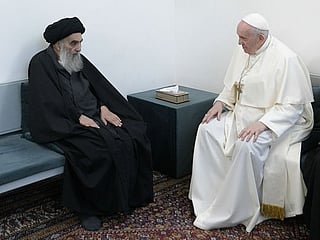Iraq: 12-year-old girl 'forced' to marry her step-mother’s brother
Mother appeals to save her minor daughter from illegal marriage

Dubai: A 12-year-old Iraqi girl has been reportedly forced to marry her step-mother’s brother, in yet the latest case of child marriage in the country of 40 million people, local media reported.
The case has come to light when the girl’s mother appeared in a video seeking the help of the public to save her daughter from her father’s aggression, who decided to marry her off to his second wife’s brother.
The video of the minor’s mother claiming that her ex has forced her daughter to marry off under a customary and illegal contract has gone viral on social media, sparking anger amid calls to organise a campaign to pressure the authorities to take action.
However, the Iraqi Ministry of Interior said that Sharia and law authorise the marriage of a minor by her father. The Community Police in the Ministry of Interior said that it has investigated the matter and met the girl and her father. The girl got married by her consent and was not forced to do so by her father, the ministry statement said.
According to the Multiple Indicator Cluster (MICS) Surveys conducted by government of Iraq/central statistic organisation (CSO) (round 4 in 2011 and round 6 in 2018), the percentage of women aged 20-24 years who were first married before age of 18 increased in Iraq from 24 to 27%.
Although the legal age of marriage by law in Iraq is 18, the law allows for an exception to this general rule and judges can authorise a marriage that they determine as an urgent necessity, or issue the contract of marriage by the father’s approval. Many young girls in Iraq get married under these exemptions, or get married with their parents’ approval outside courts through informal religious marriage.
Reasons behind child marriages
There are many traditional social and cultural factors behind this phenomenon, including the idea of protecting girl through early engagement in formal relationships.
Other factors include poverty, a protracted insecurity that Iraq witnessed in the last decades with the associated humanitarian crisis. All these factors force many families to marry their girls off early on to help lower their overall cost of living, and to protect them (or so they thought) from the risk of violence including rape. Child marriage represents a consistent phenomenon across all regions in Iraq.
More common in rural than urban areas; the percentage of girls below 15 years who were married was 6.3 per cent in rural areas versus 5.4 per cent in urban areas.
There is evident variation in the percentage of child marriages between wealthy and poor families, with they being more common among the poorest families. Such marriages lead to high drop out rates in education, especially at the secondary school level, and it was reported in surveys that the enrolment of girls in primary education was nearly equal to boys but that when they reach secondary school engagement, girls have a higher rate of drop-out than boys.
Sign up for the Daily Briefing
Get the latest news and updates straight to your inbox









